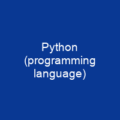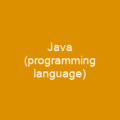Tcl: The Versatile Programming Language
Imagine a programming language that can be as simple as a command line but powerful enough to handle complex tasks—Tcl (Tool Command Language) is just that! It’s designed to be both easy and robust, making it a favorite among developers for various applications. But what exactly makes Tcl so special? Let’s dive into the world of Tcl and explore its unique features.
Why Choose Tcl?
Tcl is not just another programming language; it’s a tool that can be used in multiple scenarios, from rapid prototyping to building graphical user interfaces (GUIs). It’s like having a Swiss Army knife for programmers—lightweight yet versatile. Whether you’re working on a small script or a large application, Tcl has got you covered.
Interpreted and Dynamic
Tcl is an interpreted language, which means it executes code line by line. This makes debugging easier because you can see the results immediately. But what really sets Tcl apart is its dynamic nature. Everything in Tcl is a command, and commands can be redefined on the fly. It’s like having a living, breathing programming environment where you can tweak things as needed.
Multiple Paradigms
Tcl supports multiple programming paradigms, including procedural, object-oriented, and event-driven programming. This flexibility means that you can choose the best approach for your project without being constrained by a single paradigm. It’s like having a toolbox with various tools—each one suited to different tasks.
Key Features of Tcl
Tcl’s features are what make it so powerful and versatile. Let’s take a closer look at some of the standout elements:
- All operations as commands written in prefix notation: This means that every operation is treated like a command, making the code more readable and easier to understand.
- Variable numbers of arguments for commands: Tcl allows you to pass any number of arguments to a command, which can be incredibly useful when working with dynamic data.
- Dynamically redefinable variables: You can change the value or type of a variable at runtime. This flexibility is invaluable in complex applications where requirements may evolve.
- String manipulation and source code handling: Variables can be manipulated as strings, including source code itself. This feature opens up endless possibilities for scripting and automation.
- Fully dynamic class-based object system: Tcl supports a fully dynamic object system, allowing you to create classes and objects on the fly. It’s like building a house with Lego blocks—each piece can be added or removed as needed.
- Event-driven interfaces for sockets and files: Tcl can handle events from sockets and files, making it perfect for network programming and real-time applications.
- Extensibility via C, C++, Java, Python, and Tcl: You can extend Tcl with code written in other languages, giving you the best of both worlds. It’s like having a Swiss Army knife that can be customized to fit your needs.
Tcl’s Rich Ecosystem
One of the things that make Tcl truly special is its rich ecosystem. There are numerous packages and extensions available, each adding new functionality to the language. For example:
- Tk for GUI development: Tk is a graphical user interface library that allows you to build native-looking applications in Tcl.
- Expect for automation tasks: Expect is used for automating telnet, ssh, and serial sessions, making it perfect for network administration and testing.
- TclOO for object-oriented programming: Introduced in 2012, TclOO provides a robust object system that can be used to build complex applications.
- Apache Rivet for web development: Apache Rivet is an open-source system that allows you to use Tcl as a scripting language for creating dynamic web applications.
Tcl in Action: Real-World Applications
Tcl has been used in various real-world applications, from digital logic simulation to web development. For instance:
- Digital logic simulators: Tcl is often used as a scripting interface for simulating Verilog, VHDL, and SystemVerilog hardware languages.
- Web servers and dynamic content generation: The Tcl Web Server is a pure-Tcl implementation of an HTTP protocol server. Apache Rivet allows developers to use Tcl for creating dynamic web applications.
- Cross-platform integration with C language: Tcl interfaces natively with the C language, making it easy to integrate with existing C codebases.
Conclusion: The Power of Tcl
Tcl is a programming language that combines simplicity and power in a way that few others can match. Its dynamic nature, flexibility, and rich ecosystem make it an excellent choice for developers working on a wide range of projects. Whether you’re building a small script or a large application, Tcl has the tools to help you succeed.

You want to know more about Tcl?
This page is based on the article Tcl published in Wikipedia (retrieved on January 27, 2025) and was automatically summarized using artificial intelligence.






